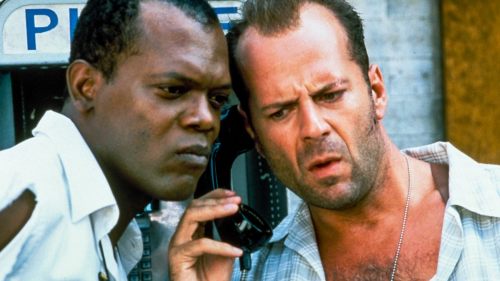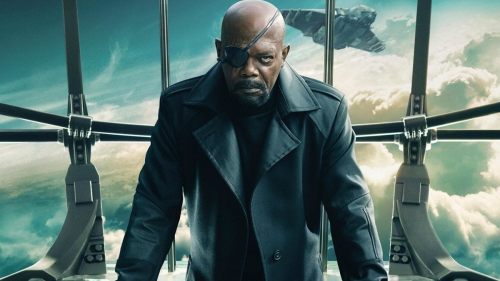SHAFT Review: Don’t Risk Your Neck (Or Your Paycheck) For This Brother Man
When Gordon Parks’ Shaft was released in theaters in 1971, it was revolutionary. When John Singleton’s Shaft arrived in the summer of 2000, it was unremarkable. And now that Tim Story’s Shaft is here, it’s ridiculous. You don’t need to be a cinephile or social historian to see how far this franchise has fallen: torpedoing the character’s authority with an incomprehensible plot, crude, out-of-step humor, and flat-out lousy filmmaking, Story applies his same regressive ideas about masculinity and cultural wokeness from Ride Along and Think Like A Man to reduce a onetime celebration of radical black empowerment into a burlesque action comedy.
Jesse Usher (Independence Day: Resurgence) plays John “JJ” Shaft Jr., a data analyst for the FBI who reaches out for help from his estranged father, private detective John Shaft (Samuel L. Jackson), after JJ’s longtime best friend Karin (Avan Jogia) dies under mysterious circumstances. Pooling their skill sets, JJ and John soon uncover a criminal conspiracy involving Karin’s veteran services group, a local supermarket making improbably generous donations to a high-profile Harlem mosque, and heroin shipments from the Middle East to Pierro “Gordita” Carrera (Isaach de Bankole), a powerful drug lord John has been trying to bring down since before JJ was born. But when JJ’s FBI superiors are too worried about public perceptions of ethnic profiling to properly follow up on the Shafts’ evidence, father and son are forced to take the law into their own hands to bring Karin’s killers to justice and protect the streets of New York.
To be honest, none of this matters except for the ensuing banter between JJ and John Shaft - and eventually, JJ’s grandfather (Richard Roundtree), who insists he’s the better of the two fathers despite having told John that he was his nephew rather than his son (a supremely lazy bit of retroactive continuity undoing a dumb idea from Singleton’s 2000 film). Revelations about who’s perpetrating what crimes where and with whose help arrive in mediocre, expository bursts every few minutes largely as a result of temporarily running out of topics for father and son to argue about - a list that includes how millennials dress, what qualifies as “real” music, how men can and should behave, the appropriate treatment of women, and acceptable signifiers of blackness. But neither are these meaningful discussions - an exchange of ideas to achieve understanding, mutual respect or some sort of generational equilibrium; rather they reinforce age-appropriate stereotypes explored purely for lowest common denominator comedy’s sake.
Working from a script by Kenya Barris (Girls Trip, TV’s Black-ish) and Alex Barnow (TV’s The Goldbergs), Story directs each scene like it’s a sitcom in search of an audience, with Usher and Jackson acting at one another at maximum volume, then occasionally creates a confusing jumble of images that are supposed to form an action scene. But worse than the editing of shots is the film’s use of music, a wall-to-wall collection of hip-hop and r&b songs that sound like they were played from a skipping CD given how badly verses and choruses are slapped together to make the acting - and scenes themselves - feel less jerky in their rhythms. Meanwhile, a score by Christopher Lennertz (Uncle Drew) clumsily attempts to weave in a few leitmotifs from Isaac Hayes’ iconic music for the 1971 original.
Still, that somehow manages to be the most skillful homage in the film to its predecessors. Story’s efforts to play with 1970s cinematic style, including multiple frames arranged on the screen and montage editing, not only feel halfhearted, they’re narratively pointless. But worst of all - and most inexplicably given Barris’ pedigree combining comedy and commentary - Shaft’s treatment of real social ills like poverty and drug abuse is not just negligent, it’s irresponsible. No movie with that name should have drug users whose condition or desperation serves as multiple punch lines.
Nevertheless, Jackson seems to be enjoying the opportunity to be in a film where he’s not only top-billed but actually gets to be the main character in most scenes, while Usher evidences talent and charisma worthy of better material to showcase it. But Regina Hall (Little) as John’s ex Maya and especially Alexandra Shipp (Dark Phoenix) as Sasha, JJ’s would-be love interest, walk away with almost every scene they’re in, even if Maya is singularly tasked with being shrill and profane and Sasha almost exclusively exists to bolster JJ’s burgeoning masculinity under the bullying guidance of his father. How a film with such anemic female characters - also including Lauren Velez (Into the Spider-Verse) as a shady supermarket owner - managed to elicit from them the best performances on screen is unclear, but they’re easily the most memorable and dynamic characters.
Ultimately, Shaft falls into the same category as Men in Black: International - a reboot that conspicuously has all of the ingredients it needs to succeed, yet somehow manages to misuse every single one of them. Only in a week when Men in Black: International comes out could Shaft not be the worst film opening in theaters.



